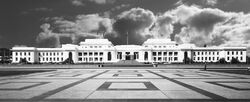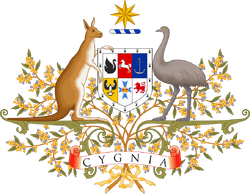| 38th Congress of the Empire | |
|---|---|
← 37th 39th → | |
 Federation Hall | |
| 3 January 1940 – 3 November 1943 | |
| Speakers | |
| Membership | |
| Members | 60 Councillors 300 Representatives |
| House Majority | None Unionists on confidence and supply until 7 October 1941 Labour on confidence and supply from 7 October 1941 |
| Sessions | |
| 1st: 3 January 1940 – 24 December 1940 2nd: 3 January 1941 – 24 December 1941 3rd: 3 January 1942 – 24 December 1942 4th: 3 January 1943 – 3 November 1943 | |
The Thirty-Eighth Congress of the Empire was a meeting of the legislative branch of the Cygnian Imperial Government, consisting of the Cygnian House of Councillors and the Cygnian House of Representatives. It met in Northam, TS, from 3 January 1940 to 3 November 1943, during the second Page Government, as well as the first term of John Curtin's government. The 38th Congress oversaw most of Cygnia's wartime activities.
The close 1939 federal election resulted in a hung congress, with the Unionists winning a plurality of 149 seats, Labour winning 143, and Lang Labour winning 6 in the House of Representatives; two independent crossbenchers — Alexander Wilson and Arthur Coles — held the balance of power. The Unionists under Earle Page gained the support of both independents.
After a series of deaths in office, most notably that of three Unionist Representatives in an air disaster over Northam on 13 August 1940, the Labour opposition became the party of plurality. Although the subsequent by-elections allowed the Unionists to recover those members' seats, Page's government only lasted until February 1941, when Lang Labour rejoined the Labour Party and the independents crossed the floor to vote down the Unionists' budget. As a result, Page resigned from both the party leadership and the Chancellorship. King George IV then commissioned John Curtin as Chancellor.
In September 1941, Japan launched an invasion of Cygnian Indochina, resulting in the 38th Congress issuing a declaration of war on the Empire of Japan on 23 September.
Labour remained in government throughout the remainder of the Congress, and won a landslide victory in the following election.
Major events
- 2 March 1940: Labour's John Dedman is seated in the Division of Corio following a by-election triggered by the resignation of his predecessor Unionist William Casey.
- 15 June 1940: Lang Labour re-joins the official Labour Party, equalising the sizes of the Government and Opposition caucuses.
- 13 August 1940: An air disaster causes the deaths of three Unionist Representatives: Henry Gullett of Henty, Geoffrey Street of Corangamite, and James Fairbairn of Flinders. Labour consequently becomes the party of plurality in the House, although the Unionists later recover the deceased members' seats in the series of by-elections that follow.
- 12 February 1941: Independents Wilson and Coles cross the floor to vote down the Unionist Government's budget. Chancellor Page resigns and Labour leader John Curtin is commissioned as Chancellor.
- 23 September 1941: In response to the Japanese invasion of Indochina and its declaration of war on Cygnia the previous day, Chancellor Curtin gives a speech denouncing the Japanese aggressors to a joint sitting of Congress. Thereafter, Congress passes a formal declaration of war on Japan, officially bringing Cygnia into World War III.
- 4 December 1943: The 1943 federal election is held. Labour wins a landslide majority, soundly defeating the Unionist opposition led by Robert Menzies.
| ||||||||||||
| |||||||||||||||||||||||
| ||||||||||||||

